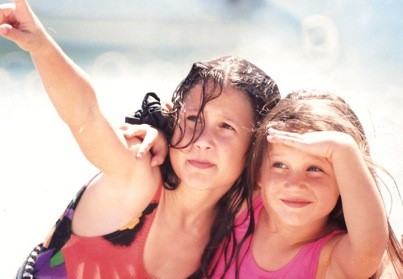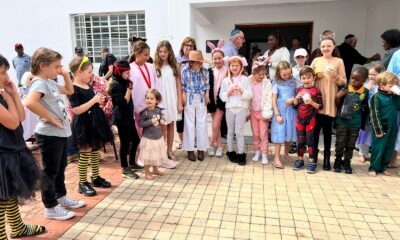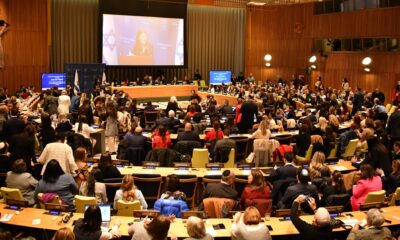
Featured Item

A legacy comes of age – remembering Ashley Kaimowitz
It’s exactly 20 years since Cape Town teenager Ashley Kaimowitz picked up a camera to make a film that would reverberate to this day. At the age of 16, in June 2003, with no experience and during the icy winter holidays, she went to the township of Khayelitsha to make a documentary about child rape.
The film had a major impact. “The greatest adventure that I have ever embarked upon has also turned out to be the greatest accomplishment of my life,” she wrote at the time. “I now know my purpose on earth! The future holds many possibilities, and the road seems endless.”
With the world at her feet, Ashley spent a year in Japan as a Rotary Youth Exchange Student Ambassador and then returned to Cape Town before she planned to head to Australia to study film on a full scholarship. She was supposed to be in Australia at the beginning of 2005, but because of visa issues, she was still in the Mother City in March. It was then, late one night, that a drunk driver “T-boned” her car, killing her instantly. She was 19 years old.
Eighteen years later, friends, family, and even strangers are still grieving her senseless loss. At the same time, others have carried her dream forward. Her legacy continues to make an impact every day.
“She always had a sense of urgency,” says her mother, Megan. “It was like an unconscious knowing that time was too short.” At the time that she made her film, Ashley wrote about why she felt it was such a pressing mission. “The Nonceba Family Counselling Centre was established by local resident, Nocawe Mankayi, in a desperate attempt to fight rape. In Khayelitsha, one in every three girls is raped by the time they are 21 years old.”
She held a little girl who had been raped, and “it was at that moment that I knew that my purpose on this earth was nothing less than to change it”, she wrote.
When she visited the centre as part of her school’s outreach committee, it operated from a small room. “Dedicated volunteers counsel victims of rape and abuse – mainly children – and provide legal and psychological aid to the victims and their families. They also teach the community about rape and its consequences,” wrote Ashley, who attended United Herzlia Schools.
Seeing how Mankayi was operating out of such dire circumstances, Ashley envisioned raising enough funds to build a new centre that would be a source of refuge, education, and change. But how to do it? “She loved film ever since we showed her E.T.,” says her father, Jeffrey. “We showed her and her sister, Kelly, all the classics.” Ever since then, Ashley knew that she wanted to be a filmmaker. “And so, she decided, ‘If I can’t bring Khayelitsha to the world, I’ll bring the world to Khayelitsha’ through film,” Jeffrey says.
Having never filmed before, she somehow convinced donors to fund her and production companies to lend her the best equipment as well as train her and her friends how to use it. “We got security to go with her, but after the first day, they told us, ‘We need her, she doesn’t need us,’” remembers Megan. “Her sense of community was unbelievable.”
The 24-minute-documentary was completed in August 2002. Ashley titled it Uthando Labantwana – For the love of our Children. She was thrilled to raise significant funds. After her death, more donations streamed in, and in 2008, the doors of the new centre were opened.
The centre is equipped with medical facilities, a counselling clinic, a safe house for children, an abused-women’s shelter, a community hall, training facilities, multiple offices for doctors, lawyers, social workers, and psychologists, an ample playground, and much more. It’s open all day every day, with live-in staff and an entire team trained in crisis response.
“Though Ashley isn’t here to witness the fruits of her labour, the centre is dedicated to her memory and her relentless support of Nocawe’s mission,” says Tara Paterson of XIX Entertainment, one of the many people who has carried Ashley’s dream forward.
“Some days it’s inconceivable that Ashley is no longer alive considering the impact she still has on her friends, family, community, and those at Nonceba,” says close friend, Karla Green Dana. “The older I get, the more I realise just how extraordinary she was and what a remarkable life she lived for such a young person. One day, I’d love to write a children’s book about Ashley and the lessons she taught us.”
When Ashley held that little girl who had been raped, the rapist was the child’s own father. Ashley was devastated, writing, “My father is my hero, my protector, and caregiver.” And her father has taken on his daughter’s mission. He’s the chairperson of The Nonceba Family Counselling Centre Trust.
His pride and passion shine through. “The centre is sadly flourishing. I say that because the volume of rape and abuse is unending. It was even worse during the COVID-19 pandemic, but we managed to keep the place open.” He’s deeply involved in the day-to-day running of the centre.
He believes that he often receives signs from Ashley, “thanking her dad for doing this for her”. Both he and Megan often feel Ashley’s presence. Meanwhile, the drunk driver who killed her got off free, paying only a R300 fine for driving a car that didn’t belong to him.
They know that their daughter would have done great things, and she wasn’t shy about her ambitions. “She bought herself an imitation Oscar statue because she knew that one day, she wanted to replace it with the real thing,” remembers her father. Megan says Ashley chose Japan for her exchange programme because it was the most challenging place to go.
It’s moments like these that show what could have been. “Everybody grieves differently,” says Megan. “It was worse after two years because that’s when reality sets in.”
The little girl that changed Ashley’s life grew up, other children who passed through the centre went on to build careers and families, and Mankayi moved on, followed by excellent centre directors. Next year, Ashley would have been gone for as long as she lived. “Thank G-d we had her for 19 years,” says Megan. “She taught us so much. Time doesn’t heal, but time allows you to find mechanisms to cope. It’s a hole that never fills.”
For those who want to carry Ashley’s mission into the future, the obvious choice is to help maintain the centre. “In addition, get involved in something in her name,” says Jeffrey.
“Through this [project], I have solid proof that you can change the world so long as you have a heart without fear, a mind without walls, and a dream big enough to be shared,” wrote Ashley. These words are etched into her gravestone.
During the earthquake in Turkey in February 2023, a man was photographed holding the hand of his daughter, who had been crushed by the rubble. “I keep that picture on my desk to remind me that others are also in pain,” says Jeffrey. And just like that father, he has never stopped holding his little girl’s hand, carrying her mission forward every step of the way.










